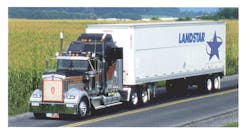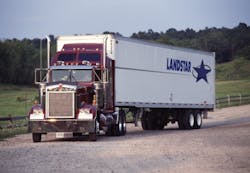Landstar downplays likelihood of capacity crunch over ELDs
Landstar System said it does not anticipate a significant capacity crunch when the electronic logging devices (ELD) mandate takes effect this December, even though 24% of the truck drivers it uses have not yet installed the devices.
The company exclusively uses owner-operators, whom it calls “business capacity owners” (BCOs), and these small business owners have generally been more resistant to using electronic log to monitor hours of service (HOS), citing privacy and cost concerns.
“Right now there’s a big wait and see from most of the small carriers,” Joe Beacom, chief safety and operations officer, said during a conference call following the release of its first-quarter earnings.
About 2,200 drivers who do business with Landstar do not use ELDs, which the company does not require provided they maintain a clean driving and inspection record.
Many are holding out hope the mandate will be tripped up by a court challenge from the Owner-Operators Independent Drivers Association (OOIDA) or President Donald Trump’s pushback on regulations.Beacom said conversations with more than 1,000 of the drivers still using paper logs indicates most plan to remain behind the wheel in 2018, regardless of the ELD outcome.
“It is a very, very small percentage really contemplating doing anything but waiting until the last moment,” Beacom said. “They understand they will have to get one. They accept it. It’s really a ‘Big Brother’ and cost-related issue.”
In a research note, Jason Seidl of Cowan and Co. noted that “while we are skeptical that many drivers will actually leave the industry by mid-2018, we do think effective capacity will be reduced by at least 3% to 5% industry-wide and more importantly for Landstar, the company could see some BCO attrition.”
In a separate note from David Ross, a managing director with the Stifel Transportation & Logistics Research Group at Stifel Capital Markets, focused on trucking firm Forward Air indicated that the refrigerated market “is likely to feel the ELD pinch as much, if not more, than any other sector.”
Despite initial ELD resistance from drivers, Landstar’s Beacom said there has been a “surprisingly positive sentiment” from many of its BCOs regarding the devices since the carrier instituted a training program back in 2013.
“Once they are installed, the BCOs tend to adopt them and use them,” said Beacom, adding that drivers benefit from easier fuel-tax computing and logbook submissions.
About the Author
Neil Abt
Neil Abt is a former FleetOwner editor who wrote for the publication from 2017 to 2020. He was editorial director from 2018 to 2020.

